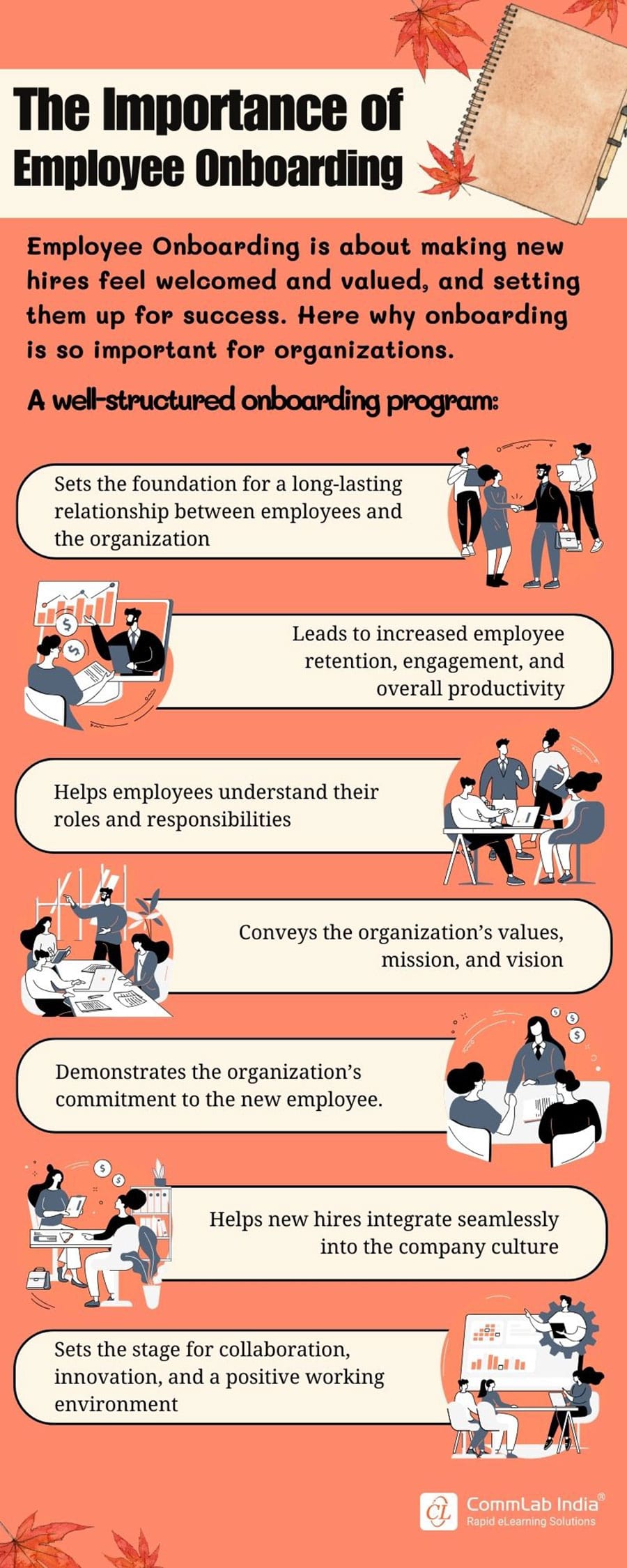Why Effective Employee Onboarding Matters [Infographic]
Talent acquisition and retention have become crucial, and effective onboarding is a first step towards it. Let’s explore more.

Embarking on a new job is like stepping into a whole new world, where compliance, culture, and connection shape your journey. Making sure a new hire feels welcomed isn't just about handing them a handbook, it's about integrating them into the organization's culture and ensuring that they fell welcomed.
Why is Effective Employee Onboarding Important?
Efficient onboarding matters significantly as it sets the tone for an employee's entire tenure within an organization. A well-defined onboarding process not only ensures that new hires quickly acclimate to their roles and responsibilities but also establishes a foundation for long-term engagement and success. Efficient employee onboarding instills confidence in new employees by providing them with the necessary tools, resources, and support to fit in the new work environment effectively. Moreover, it fosters a sense of belonging and purpose by clarifying expectations, outlining career pathways, and integrating them into the organizational culture.
Tips to Ensure Effective Onboarding
1. Set Clear Expectations
One of the foundational pillars of effective onboarding is setting clear expectations for new hires right from the start. This involves transparently communicating job responsibilities, performance metrics, and organizational values to align individuals with company objectives and cultivate a shared sense of purpose. By providing clarity on what is expected of them, new employees can better understand their roles within the organization and the contributions they are expected to make.
When individuals understand how their roles contribute to broader organizational goals and align with core values, they are more likely to feel motivated and engaged in their work. This clarity also helps set the tone for a positive organizational culture, where employees are empowered to thrive and succeed. Ultimately, by setting clear expectations from the outset, organizations lay a strong foundation for new hires' success and integration into the company culture, driving both individual and organizational growth.
→ Download Now: Exploration and Discovery for Exceptional Onboarding
2. Offer Structured Training
Implement a structured onboarding curriculum that covers essential information about the company, its policies, procedures, and systems, as well as job-specific training to equip new hires with the knowledge and skills needed to succeed. This structured framework provides a roadmap for new hires, enabling them to assimilate seamlessly into the organization and understand the critical elements that define its culture and operation. By breaking down the onboarding process into a well-organized curriculum, organizations can systematically introduce employees to various facets of their roles, instilling confidence and proficiency.
3. Extend Mentorship and Support
Assign mentors or buddies to new hires to provide guidance, support, feedback and space for open communication during the onboarding process. Mentors serve as trusted allies, offering insights into company culture and providing practical advice to help new hires overcome challenges and thrive in their roles. By alloting mentors or buddies, organizations provide a valuable lifeline for new employees, offering guidance, support, and a safe space for open communication. These interactions create opportunities for new hires to voice their questions, concerns, and aspirations, fostering a culture of transparency and collaboration.
4. Offer Engagement
By incorporating interactive and engaging activities into the onboarding program, organizations create opportunities for team building, knowledge sharing, and relationship building. These activities, ranging from icebreaker games and group discussions to team meetings and virtual events foster connections and create a sense of belonging among employees.Furthermore, embracing microlearning formats such as videos, infographics, and interactive modules or gamification and storytelling adds another layer of engagement to the onboarding experience. By delivering key insights about the organization in a visually stimulating and interactive manner, new hires are more likely to remain engaged and enthusiastic throughout the onboarding process. These formats provide a dynamic platform for introducing company culture, values, and processes, sparking curiosity and igniting a sense of excitement about the journey ahead.
Wrapping it up!
By reducing turnover rates, accelerating time-to-productivity, and cultivating a positive brand, efficient onboarding lays the groundwork for long-term success. Investing in a well-structured employee onboarding program pays dividends in terms of employee satisfaction, retention, and overall organizational success. As organizations strive to optimize their onboarding processes, it's essential to recognize the broader impact and benefits that efficient onboarding brings. For actionable insights on developing an engaging onboarding program, download our case study on new hire onboarding for a global biopharma major and discover how we elevated the onboarding experience for the employees to the next level.







